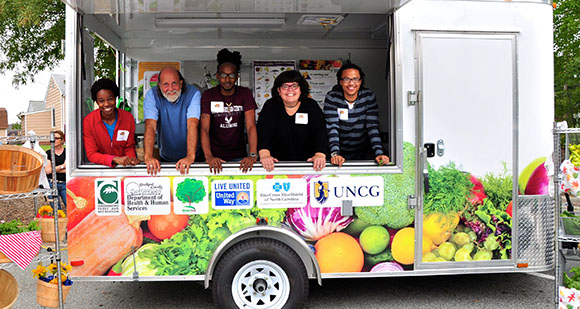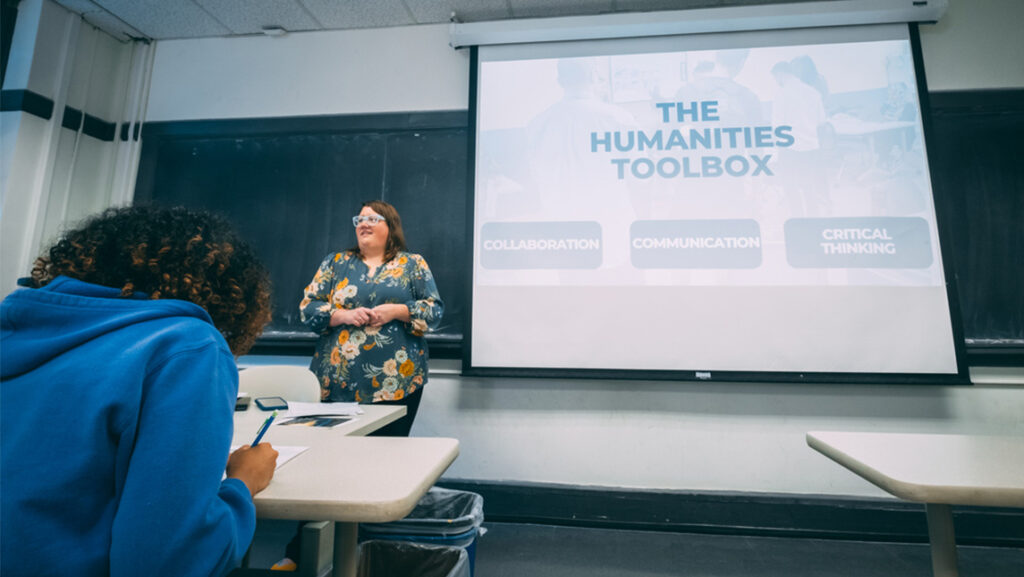Food deserts. The term may elicit dry, distant wastelands, but the reality is much closer to home. Food deserts are metropolitan nutritional deserts in which residents have limited access to healthy food. They are often located in neighborhoods with the highest poverty rates, the highest ethnic and racial minority populations, and the highest rates of chronic health problems. In 2012, the Greensboro and High Point areas were tied with New Orleans as the second most food insecure group in the country.
 Several local organizations have stepped up to the plate to address this rising problem. In order to have the most impact, leaders first need to help the community understand the issue at hand, and then coordinate their efforts. That’s where Dr. Marianne LeGreco steps in.
Several local organizations have stepped up to the plate to address this rising problem. In order to have the most impact, leaders first need to help the community understand the issue at hand, and then coordinate their efforts. That’s where Dr. Marianne LeGreco steps in.
LeGreco is an associate professor of communication studies at UNCG, where she combines her expertise in communication with her interest in food systems. She advocates to improve awareness of food insecurity, and she uses her prowess and connections in her field to further collaboration between local organizations trying to eliminate food insecurity.
A vital component of successfully eliminating food deserts is consistent communication amongst different organizations within the Triad. “A lot of different people are in their own little pocket, and they’ll talk to each other every once in a while but there’s no really effective networking going on,” LeGreco says.
That is why LeGreco, along with partners from the Guilford County government, Greensboro-area universities, and other local organizations, created the Guilford Food Council Task Force. Since 2013, the Task Force has provided a networking space for people and organizations involved in the Guilford County food system. Through the Task Force and other related projects, LeGreco creates productive dialogue, helping transform ideas into realistic plans.
The Task Force unifies a plethora of partners and projects. One example is the City Oasis Project, an urban farm located in east Greensboro that grows food year-round. The project is a collaboration between Vision Tree Community Development Corporation, Guilford County Department of Health and Human Services (GCDHHS), the City of Warnersville, and the UNCG Communication Studies Department.
 The City Oasis Project recently began selling food through the Mobile Oasis Mobile Farmer’s Market – a market on wheels started by GCDHHS and the City of Greensboro. The mobile market brings fresh produce directly into food deserts, eliminating transportation costs and time constraints for residents.
The City Oasis Project recently began selling food through the Mobile Oasis Mobile Farmer’s Market – a market on wheels started by GCDHHS and the City of Greensboro. The mobile market brings fresh produce directly into food deserts, eliminating transportation costs and time constraints for residents.
When encouraging the public to learn about food deserts, LeGreco educates citizens on the food system as a whole, which includes growing, transportation, and sales. The City Oasis Project and the Mobile Oasis Mobile Farmer’s Market address growing and transportation, but produce can be expensive for low-income households. To improve the sales side of the equation, the mobile market will accepting SNAP/EBT and implementing programs such as frequent buyer cards and food stamp incentives.
“I think [one of the most] challenging things that we face is that it’s really easy to talk about the ideas, but when it comes to actually following through with the details, because the details are what gets it done, that process of connecting ideas to details is very difficult,” LeGreco says, “And so what I hope to be able to do, in terms of food systems, is to help connect all of these really amazing ideas we have when it comes to food to the details that can actually see them through to the end.”
 Article Author Emma Troxler is a senior at UNCG, double majoring in English and Women’s and Gender Studies. She is a Media and Communications Intern for UNCG’s Office of Research and Economic Development. Her passion for writing about other people’s research led her to her current position.
Article Author Emma Troxler is a senior at UNCG, double majoring in English and Women’s and Gender Studies. She is a Media and Communications Intern for UNCG’s Office of Research and Economic Development. Her passion for writing about other people’s research led her to her current position.
Graphics by Emma Troxler and Kevin Flanagan.



